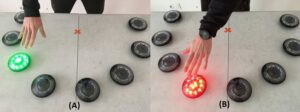So, you think you’re fast? You might be the kind of person who always catches toast before it lands butter-side-down, or you might have snagged a falling phone at the last second. If you really want to test your reflexes, you may take a speed reaction test. Not just great athletes and fast video game players can take these examinations. You can try them, and the results could surprise you.

Have you ever hit the snooze button before your brain was awake? That’s muscle memory, being able to move quickly when you’re half asleep, and a lot of reflex activity. Your brain and body are attempting to show that they are in sync when you take a response test. You will feel like lightning some days. Some people are like molasses in January. It can be fun, a little annoying, and more revealing than you thought.
Let’s speak about how things work. Most reaction tests work by giving you simple prompts, such a light flashing and you tapping your screen. Sometimes it’s sound; a buzzer goes off and you hit a button with your finger. There are also puzzles with more than one step, where you have to deal with distractions while keeping one ear open for your cue. It’s like a more advanced version of Simon Says. The best part? You can see your fingers surge ahead or fall behind, and sometimes both happen in the same minute.
People who play video games appreciate testing their reflexes, but these talents are useful in other areas as well. Think about driving. The lights turns red, and the minivan that is drifting three cars ahead slams on its brakes. There is more to reaction training than just getting high scores; it can also keep you safe in the real world. Split-second timing is important in high-stakes situations like firefighters responding to emergencies, surgeons finding problems during surgery, and students answering quiz questions quickly.
But people aren’t robots. Some of us act like cheetahs, while others act like pigeons on a lazy Sunday. Things sneak in. Did you not sleep well? The time it takes to react is slow. Did you drink too much coffee? If your fingers are shaky, you can hit the wrong button. Even mild dehydration might slow down the brain. Stress, food, and even whether or not you remembered your glasses all affect those annoying milliseconds.
Have you ever seen athletes do stupid drills before a race? Catching tennis balls, avoiding foam bats, and jumping at random beeps. These aren’t simply for looks. These kinds of drills make brain circuits stronger. Try using different patterns to deceive your brain if you want to level up. Change hands, close your eyes, and make some noise to keep your brain guessing. It might seem strange, but even dancing in your kitchen to a beat that changes all the time is practice.
Don’t give up if your first test makes you grumble; practice makes perfect. Improvement won’t always be straight. Sometimes you’ll fail in a big way, like when/us or or or or or. or Just laugh it off, try again, and see how adaptability sneaks in.
Put your buddies to the test. Believe me, nothing makes things better like good old-fashioned competition. The reaction test goes from being a boring solo act to a vibrant battle all of a sudden. You’ll speak trash, pick apart missed beats, and come up with imaginative reasons why you “would’ve totally nailed it if the sun hadn’t been in my eyes.”
One strange thing you may do is respond to things that happen every day. When your toaster pops, clap. Try to answer a ringing phone as quickly as you can. Make the boring things into a fun challenge, and you’ll start to see those small gains add up.
Give them a reaction test the next time someone brags about how fast their fingers are. Check out who really wins and enjoy the surprises that come with it.